Key Takeaways
- AI transforms real estate decision-making through predictive analytics that reveal real-time market trends, forecast price fluctuations, and produce more accurate property valuations than traditional methods.
- Operational efficiencies include streamlined property management, automated document processing, predictive maintenance, and remote monitoring capabilities that reduce costs while improving tenant satisfaction.
- Customer experience improves through 24/7 AI chatbots, personalized property recommendations, and immersive virtual tours that help buyers form emotional connections before physical visits.
- Successful AI implementation requires clear objectives, comprehensive data strategies, appropriate infrastructure, and organizational readiness - typically starting with focused pilot projects before broader deployment.
- The most impactful applications include smart matching algorithms, automated valuation models, predictive maintenance, document automation, and sophisticated investment analysis tools that process multiple data streams simultaneously.
Key Benefits of AI Integration in Real Estate
Enhanced Decision-Making Through Data Analytics
Today's real estate success stories increasingly feature AI algorithms at their core.
Smart investors now identify opportunities through data that reveals market trends in real-time rather than weeks after the fact.
When you leverage these tools, you gain visibility into emerging neighborhoods before they hit mainstream awareness.
Predictive analytics for market trends does more than spot patterns – it helps you forecast price fluctuations and occupancy rates with remarkable accuracy.
AI models examine everything from local employment figures to infrastructure development, giving property managers the foresight to adapt strategies ahead of market shifts rather than reacting to them.
The valuation process has evolved dramatically too.
AI can evaluate hundreds of variables simultaneously through Automated Valuation Models, producing more accurate estimations than traditional methods ever could.
This helps everyone from first-time homebuyers to institutional investors understand true market value with greater confidence.
Smart pricing optimization ensures your rental units stay competitive while maximizing returns.
Tools from companies like Likely.AI analyze past sales data and demographic information to predict likely buyer profiles.
Meanwhile, AI-assisted design processes use IoT sensors and computer vision to create spaces that truly match how people live and work, not just how designers think they should.
Operational Efficiency and Cost Reduction
The benefits of AI in real estate extend well beyond analytics into day-to-day operations.
Tasks that once ate up hours of staff time – lease renewals, maintenance scheduling, tenant communications – now happen seamlessly in the background.
This streamlined property management approach frees your team to focus on relationship building rather than administrative busywork.
Document processing becomes remarkably more efficient with AI systems handling contract reviews, title work, and lease management.
You'll experience fewer errors and faster transaction times while reducing paperwork throughout your operations. Imagine catching maintenance issues before they become expensive emergencies.
When you integrate AI into property systems, predictive maintenance identifies potential equipment failures early, extending the life of valuable assets and preventing tenant frustration from unexpected outages.
Traditional real estate management demanded constant physical presence, but today's smart building features allow comprehensive remote monitoring.
You can adjust environmental settings, detect water leaks, and manage security from anywhere while reducing utility costs and improving tenant satisfaction.
Virtual tours and 3D modeling have transformed the showing process, saving time on the market while making the buying experience more efficient for everyone.
Automated reporting pulls data from multiple sources to give you instant performance insights that once required days of compilation work.
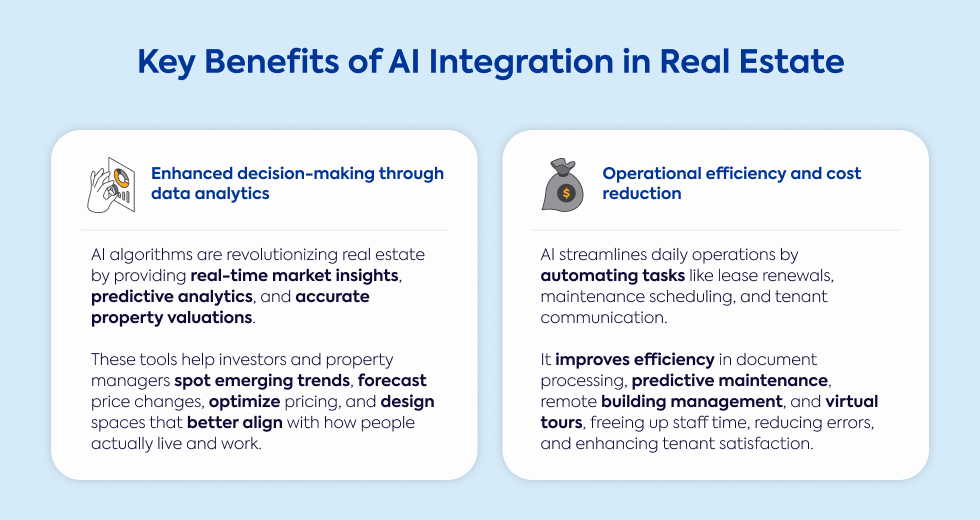
Improved Customer Experience and Engagement
AI chatbots have revolutionized how prospects interact with property information.
Questions get answered instantly, showings get scheduled automatically, and detailed information flows 24/7 – no more waiting for business hours to get essential details.
Today's real estate websites remember visitor preferences and search history, creating uniquely personalized experiences where potential buyers see relevant properties first.
This uses AI to match people with spaces that truly fit their needs, not just their search filters.
Conversational AI creates natural interactions that guide buyers through complex property searches with contextual understanding rather than rigid command structures.
In dynamic real estate markets where timing matters, these tools identify and qualify leads automatically so you can focus attention on the most promising opportunities.
Virtual and augmented reality technologies powered by AI for realtors create immersive property experiences that help buyers form emotional connections before physical visits.
This approach proves especially valuable for properties under construction or renovation, allowing prospects to "see" finished spaces before they exist.
Risk Mitigation and Compliance Management
Artificial intelligence brings powerful capabilities to risk assessment and legal compliance.
Advanced systems scan listings for potential Fair Housing Act violations, helping you avoid costly legal issues before they arise.
Throughout the real estate market, fraud detection has become more sophisticated with AI and machine learning integration to identify suspicious patterns in transactions.
AI may spot compliance issues that human reviewers miss by examining property listings from multiple regulatory angles simultaneously.
With a real estate platform powered by AI, due diligence becomes more thorough while requiring less time – the system quickly analyzes property records, zoning laws, and environmental reports to identify potential concerns.
The adoption of AI helps maintain listing accuracy through computer vision technology that can detect photo alterations that might misrepresent property conditions.
This objective approach to property valuations reduces bias in the appraisal process, creating more transparency and consistency in pricing throughout the market.
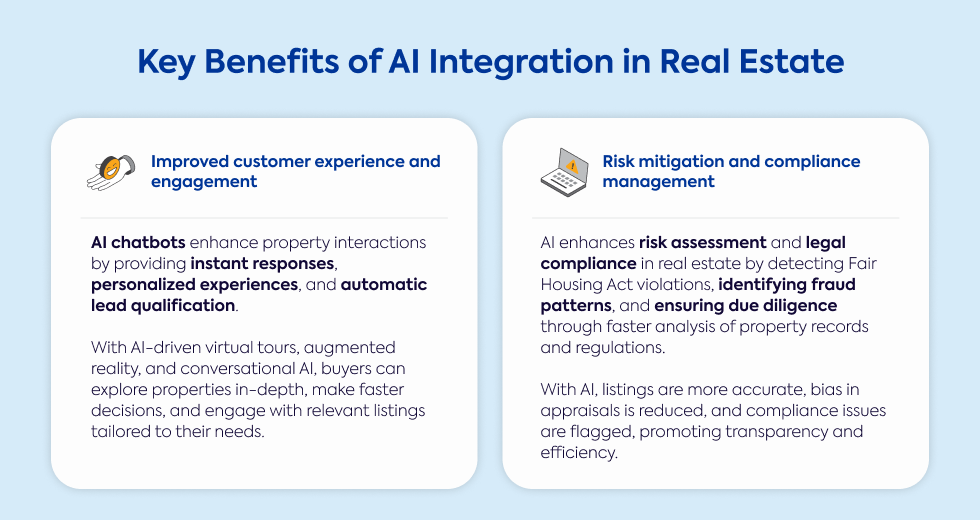
Top Applications and Use Cases of AI Across the Real Estate Value Chain
Property Search and Matching
Smart matching algorithms represent the most visible use cases of AI in the property market.
Instead of overwhelming prospects with endless listings, these systems connect people with homes based on stated preferences, behavioral signals, and demographic patterns.
Real estate agents save countless hours by presenting clients with truly relevant options rather than forcing them to sift through inappropriate properties.
The ability of AI to provide personalized recommendations transforms the search experience into something that feels intuitive and efficient.
Real estate app development companies now build intelligence directly into search functions that go beyond simple filters to understand nuanced preferences.
This common use of technology delivers immediate value that everyone from independent agents to major brokerages can implement to improve client satisfaction.
Virtual Experiences and Property Visualization
AI used in virtual tour creation has fundamentally changed how people explore properties.
The combination of AI and real estate visualization tools gives buyers spatial awareness that static photos simply cannot provide.
This allows real estate professionals to focus on high-value activities instead of conducting endless showings for people who ultimately aren't interested.
AI-driven real estate visualization excels at showing how spaces might look with different renovation options or furniture arrangements.
Real estate brokers leverage these tools to showcase more properties to more clients with minimal time investment.
In residential real estate especially, these immersive experiences help buyers develop emotional connections to properties before they ever visit in person.
Automated Valuation and Pricing Optimization
Accurate pricing represents a fundamental challenge in the real estate business.
Automated valuation models powered by AI analyze comprehensive market data to produce estimates that outperform traditional methods.
This technology proves particularly valuable in commercial real estate with its complex variables affecting property values.
Companies that use AI in real estate valuation gain competitive advantages through more accurate pricing strategies.
Examples of AI in real estate valuation abound – Zillow's "Zestimate" represents perhaps the most well-known application, with error rates consistently decreasing as algorithms improve.
Artificial intelligence in real estate removes subjective bias from appraisals by applying consistent methodology across all properties.
AI real estate solutions analyze market conditions in real-time to help property owners optimize rental rates while maintaining competitive positioning.
The applications are vast and growing across all property types, from single-family homes to large commercial developments.
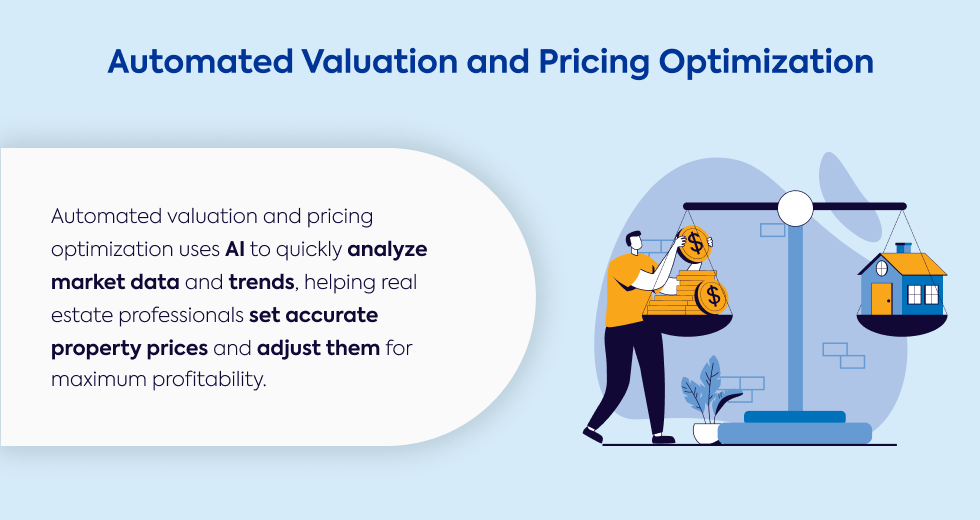
Smart Property and Facility Management
Modern property management looks dramatically different than it did even five years ago.
AI tools monitor building systems, track maintenance needs, and optimize energy usage automatically.
Real estate today incorporates smart building technology that learns from usage patterns to adjust environmental controls based on occupancy and preferences.
AI technologies enable predictive maintenance that identifies potential equipment failures before they occur.
This proactive approach benefits both owners and tenants – managers and real estate operators gain efficiency while occupants enjoy more responsive environments.
Real estate investment managers receive comprehensive performance tracking across energy consumption, space utilization, and maintenance activities.
Traditional approaches required constant physical presence, but AI is no longer optional for competitive property management firms looking to maximize efficiency.
Smart systems coordinate repair schedules, track completion status, and generate performance reports that highlight important metrics like occupancy rates and tenant satisfaction – all with minimal administrative overhead.
Document Processing and Contract Automation
Companies that integrate AI into document management experience radical efficiency improvements.
The technology automatically extracts key information from leases, contracts, and other documents that would otherwise require manual review.
Gen AI tools generate standard agreements with proper terms and conditions while ensuring all necessary clauses appear.
AI for real estate document management reduces errors while maintaining consistency across all paperwork.
Throughout the real estate sector, this automation reduces administrative burden significantly.
Predictive analytics can help identify upcoming contract events like lease renewals or option dates.
Artificial intelligence is transforming contract management by flagging potential issues before they create problems, saving time and reducing legal risks.
Predictive Analytics for Market Trends
AI in real estate has revolutionized market analysis through systems that forecast trends by examining economic variables, demographics, and historical patterns.
Understanding the real estate industry requires keeping pace with constantly changing market conditions, and the power of AI in pattern recognition helps predict neighborhood evolution and price movements before they become obvious.
When examining current real estate conditions, AI processes vastly more information than human analysts ever could.
AI in real estate today includes tools that project demand for specific property types and locations.
This AI innovation transforms market analysis by combining real-time monitoring with historical pattern recognition to help professionals navigate complex market dynamics with unprecedented clarity.

Lead Generation and Nurturing
Transforming the real estate industry requires improvements throughout the customer acquisition process.
AI tools analyze past transactions alongside demographic data to identify likely buyers or sellers.
These systems help real estate professionals identify promising leads by examining indicators like property age, ownership duration, and life events.
Various tools can help segment audiences for targeted marketing campaigns with tailored messages for specific lead types.
AI tools can help automate follow-up communications based on prospect behavior, allowing real estate professionals to focus on high-value activities while automated systems handle routine tasks.
AI in commercial real estate lead generation identifies potential tenants through analysis of business expansion patterns and lease expiration dates.
The future of AI in lead nurturing includes increasingly sophisticated behavioral analysis to identify subtle indicators of buying intent.
Throughout the AI market, qualification tools continue to evolve to help prioritize the most promising opportunities.
Investment Analysis and Portfolio Optimization
AI applications in real estate extend to sophisticated investment analysis, evaluating potential acquisitions based on projected returns and risk factors.
The technology helps identify investment opportunities by processing multiple data streams simultaneously, assessing everything from market conditions to property characteristics.
This comprehensive analysis represents the true potential of AI in investment evaluation.
Today's real estate AI platforms allow investors to build and test strategies using historical data before committing actual capital.
AI tools designed for real estate agents help clients understand investment potential through intuitive visualizations of complex financial data.
You can use AI to evaluate properties against specific investment criteria automatically, screening dozens or hundreds of potential acquisitions to identify the most promising options.
AI is transforming the real estate investment landscape through more sophisticated risk assessment that identifies potential concerns from environmental issues to neighborhood stability factors.
The integration of AI in real estate investment analysis creates more comprehensive evaluation processes examining both property-specific factors and broader market conditions.
Implementation Roadmap: From Strategy to Execution
Defining Objectives and Identifying Use Cases
Implementing generative AI in real estate requires clear objectives.
Start by assessing your organization's specific challenges and identify where technology could deliver the greatest impact.
Companies that leverage AI effectively begin with desired outcomes in mind rather than chasing technology for its own sake.
The application of AI in real estate planning should prioritize high-impact use cases where automation or improved analytics would create significant operational improvements.
Many real estate AI solutions promise transformative results, but successful implementation requires focusing on applications that align with your strategic goals.
Working with an experienced AI development company accelerates implementation by bringing specialized expertise that helps avoid common pitfalls.
Organizations transitioning from traditional real estate operations may face resistance to change, making clear objectives and demonstrable benefits essential for building internal support.
Companies successfully transforming real estate operations through AI typically start with focused pilot projects before broader deployment.
This controlled approach allows for testing and refinement while building organizational confidence in the technology.
Developing a Comprehensive Data Strategy
Forward-thinking real estate companies recognize data as their most valuable asset.
You need to use AI in real estate data management strategically, starting with an inventory of available information and identifying gaps that might limit analytical capabilities.
The strategic use of AI in real estate depends fundamentally on data governance.
Establishing clear policies for collection, storage, and access creates the foundation for effective analytics.
Making the most of AI in real estate today requires connecting information across property management systems, maintenance records, and tenant interactions.
Many real estate AI platforms require structured data to perform effectively. Investing in data organization creates the foundation for successful implementation.
AI is transforming real estate data analysis by finding patterns and relationships that might not be apparent through traditional methods.
The ongoing integration of AI in real estate operations increasingly depends on comprehensive data strategies that prepare organizations for continued technological evolution.
Building the Technology Infrastructure
Implementing AI technologies requires appropriate infrastructure tailored to your specific needs.
Many real estate companies need to modernize their technology foundations before implementing advanced capabilities.
When selecting AI for real estate applications, prioritize tools that integrate seamlessly with your existing systems.
Look for AI solutions that include appropriate safeguards against potential issues like discriminatory outcomes and privacy concerns.
Real estate technology investments should consider both current needs and future possibilities through flexible infrastructure that allows for adaptation as capabilities evolve.
Creating Actionable Tools and Systems
Selecting the right AI tool for specific applications significantly impacts implementation success.
The potential of AI requires thoughtful implementation that delivers insights in formats supporting real-world decision-making.
Different real estate AI applications require different interface designs – conversational tools need natural language capabilities, while analytical applications should present information through intuitive visualizations.
Organizations achieving success with AI-powered systems optimize user experience to integrate seamlessly into existing workflows.
When implementing AI systems that revolutionize workflows, provide adequate training and support resources to help team members understand both how to use new tools and the value they deliver.
Managing Change and Developing Skills
The real estate industry faces significant transformation through technology adoption.
Organizations that proactively manage this change create smoother transitions and achieve better results.
Many real estate agents need support during technology transitions through training resources that demonstrate how new tools enhance rather than replace their expertise.
For real estate professionals, AI represents both challenge and opportunity requiring new skills while creating possibilities for greater productivity.
Companies implementing AI-powered real estate systems should communicate benefits clearly to help team members understand how technology supports their work rather than threatening their positions.
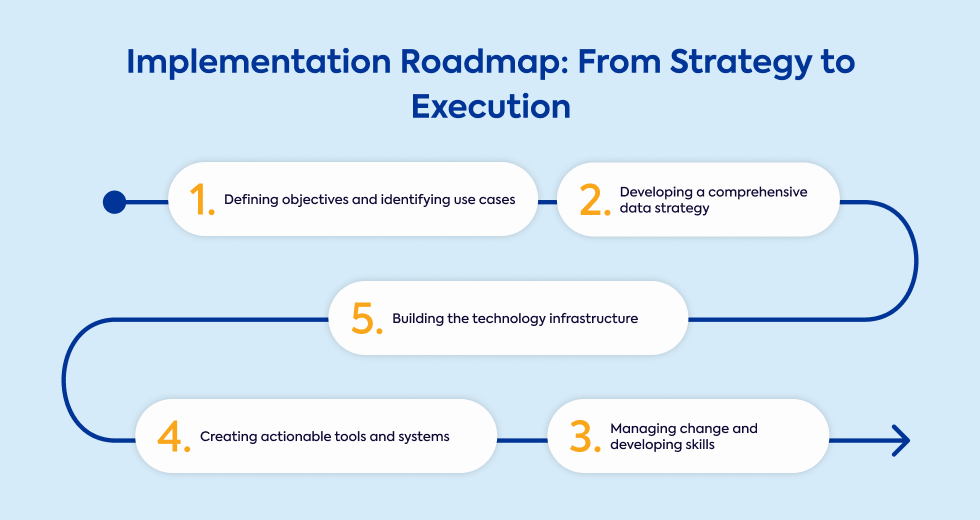
Addressing Implementation Challenges
Data Quality and Accessibility Issues
The effectiveness of AI applications depends heavily on data quality.
Ensuring information is accurate, comprehensive, and properly structured supports reliable analytical processes.
Making data-driven decisions requires confidence in underlying information through verification processes that identify and correct inaccuracies.
The digital transformation of real estate operations creates new possibilities for data collection and analysis requiring comprehensive strategies addressing both technical and organizational aspects of information management.
Integration with Existing Systems
Implementing AI in real estate operations often requires connecting with legacy systems.
Mapping data flows and establishing appropriate integration points between new and existing technologies creates a foundation for success.
Tech integration represents a significant challenge for many organizations, making experienced implementation partners valuable for navigating complex processes.
Throughout the digital real estate landscape, successful technology deployment depends on seamless connections between systems through comprehensive integration strategies addressing both technical and operational requirements.
Regulatory and Ethical Considerations
Ethical AI use in real estate requires attention to potential biases and discriminatory outcomes.
Implementing safeguards prevents technology from perpetuating historical inequities in housing and property access.
Organizations face compliance challenges when implementing AI in regulated environments requiring systems to meet all applicable requirements for fair housing, consumer protection, and privacy.
Responsible AI implementation includes appropriate transparency about decision-making processes to build trust with customers and regulatory authorities alike.
Talent and Organizational Readiness
Successfully implementing AI requires workforce adaptation throughout organizations.
Providing training resources helps team members develop necessary skills for working with new technologies.
Organizational change management represents a critical success factor in technology implementation through clear communication channels and support resources.
Long-term success with AI requires ongoing talent development creating learning pathways that help team members build progressively more advanced skills as technologies continue to evolve.
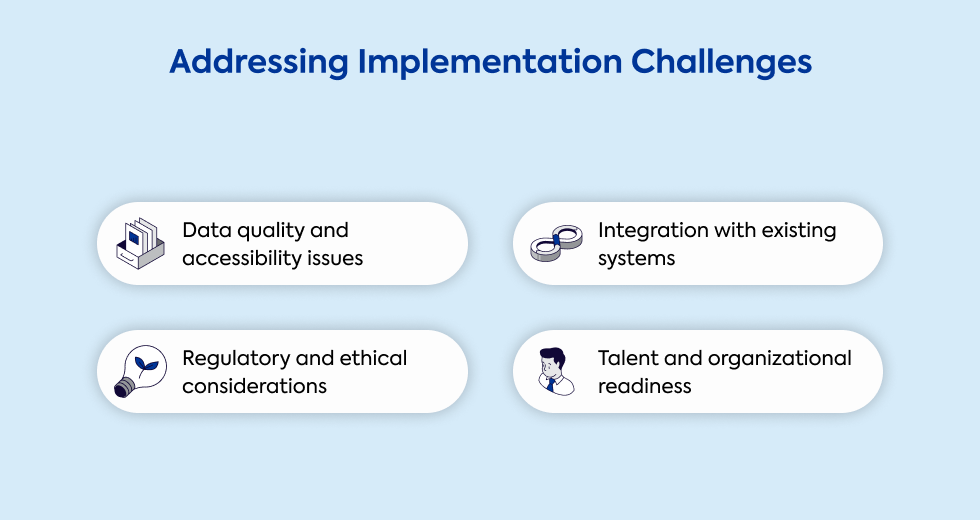
Ready to Transform Your Real Estate Operations with AI?
Implementing AI solutions requires clear strategy, technical expertise, and seamless integration with existing systems - challenges that can seem overwhelming when tackled alone.
At Gauss, we specialize in developing custom software solutions that bring the power of AI to real estate operations without the implementation headaches.
Our team of experienced developers can help you identify high-impact use cases, build the right data infrastructure, and create intuitive AI tools tailored to your specific real estate needs - whether that's predictive analytics, automated valuation models, or intelligent property management systems.
Don't let technology barriers prevent you from gaining a competitive edge.
Contact Gauss today to start a conversation about how we can help you realize your AI-powered real estate project.
